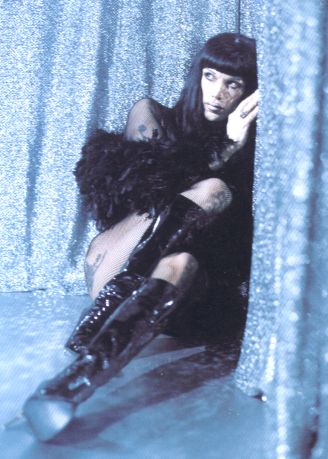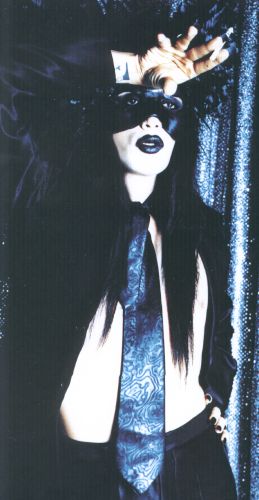

The fortunes of Pete Burns, and thus Dead Or Alive, have, like the song says, spun round like a record, baby. Formed in 1980, the band's first album Sophisticated Boom Boom spawned only a minor hit, "That The Way I Like It", and caused a bit of a ripple. It wasn't until their collaboration with producers Stock, Aitken and Waterman on the 1984 album Youthquake that Dead Or Alive really arrived. "You Spin Me Round (Like A Record)" was a groundbreaking single and an international number one but it made successive hits like "In Too Deep", "My Heart Goes Bang", "Lover Come Back", "Something in My House" and "Brand New Lover" seem less successful by comparison. Where do you go after number one? When DOA's relationship with Stock, Aitken and Waterman soured, and the band split acrimoniously with record company Epic, the end seemed nigh.
But then there was Japan. Dead Or Alive's
self-produced fourth album Nude went largely unnoticed in
Australia yet the single "Turn Around And Count 2 Ten"
stayed at number one in Japan for 17 weeks. Their appeal in Japan
was such that even Michael Jackson had to reschedule concerts
around Dead Or Alive's tour. A second single "Come Home With
Me Baby", was the biggest selling dance record in America in
1989 and the band toured the US extensively. But to their
homeland UK audience and here in Australia, Dead Or Alive were
washed up. Gender bending was sooo 10 minutes ago, and as
rock and grunge made a chart comeback, dance music was
increasingly produced by anonymous studio outfits, a phase that
characterised the early '90s. Burns' personal life also suffered
twists and turns. When his mother became terminally ill with
cancer, the band's career was put on hold while he nursed her. He
lost friends to Aids. He suffered a nervous breakdown and
depression.
But even their dramatic resurrection at Sleaze Ball in Sidney last years, Burns still managed to release "Sex Drive" under the name Glam and "Rebel Rebel"' (dedicated to Courtney Love) under the name International Chrysis. Possibly the best way to describe Dead Or Alive's successes and failures is "extreme".
The same goes for Pete Burns himself. A toxic combination of traditional masculinity and traditional feminity, his current incarnation goes by the apocalyptic cryptogram of Nukleopatra - Nukleo as in bomb, Patra being the Latin feminine of Peter. In the title song of their last album, Nukleopatra is described as "a brand new gender: not a man, woman, boy or a girl" and has "a brand new species: in a mixed up, muddled up, shook up world". Says Burns of the lyrics, "It seems a shame to me that if something doesn't look like an obvious male, then it must be female. I think there's a third gender out there and it's not even a sexually oriented thing. It's a visually oriented thing: of people being their natural selves and not forcing themselves into one mould or the other."
"But I think in our lifetime we'll also see physical mutations in our gender. In the way society evolves. I do believe there'll be more than two genders on a scientific level. Mankind's got to mutate in some way. I mean, once we were supposed to have walked on all fours. There might be a third, maybe a fourth gender. I just hope I'm around to see it. Then again, maybe they're out there now but they're not going on 60 Minutes being treated as freaks."
Pete, complete with fuck-you attitude and fuck-me boots, like to make a mockery of traditional maleness and femaleness, and is rewriting the history books in the process. Just as we have a deconstructive postmodern Madonna (the whore as opposed to the virgin); a postmodern Prince (pompous pop star as opposed to royal prat); and postmodern President Of The USA (rebellious antipatriarchs as opposed to right-wing politicos), we now have a postmodern Cleopatra.
Meet the new Cleopatra in a social situation and he comes across as a callous creature; cold handshake, wicked snarl, jet black chemically-straightened fringe almost covering rolled-back eyes behind cosmetic contact lenses. In public, Burns looks and play like a real rock'n'roll wanker. Renowned for being quick with the quips he has been known to savage many a rival popster and developed quite a taste for toasted journalist. It is even speculated that Dead Or Alive's declining fortunes in the late '80s was due in no small way to Burns' malicious treatment of members of the music industry.
But get him one-on-one a bit of the bitch subsiides. 3A lot of bitching was done from a pure PR angle", he now insists, referring to his public disputes with Boy George at the height of both their careers. "I knew George personally and I get on with him very well. But at the time, in the '80s, when you're just a kid and you're having a number one record, you think you rule the world, and that you can just say, 'Off with his head!'
"It was very easy to be bitchy and flippanty, and none of if was particularly meant or heartfelt. It was just funny one-liners the we both found very easy to do. Unfortunately they were immortalised in print."
Whether through bad press, bad timing or a natural shift in public taste, the temporary downfall of Dead Or Alive was aided by the failure of Nude in the UK. Nude wasn't a bad collection of songs; it just didn't fit into either the serious soul or relentless techno categories that prevailed under the banner of dance music at the time. And while Kylie kept dishing out the saccharine hits there was a perception that DOA were nothing without SAW. 3I had no time for Kylie Minogue and nursery rhyme songs", says Burns. "I never wanted to be like that. I always started off with more of a rock sensibility and I think that hindered Dead Or Alive more than helped us because if people see a singer that dresses up and looks flamboyant, they expect you to be all soft-edged, to almost have an apology for your existence. Well that's not the way I am and our music is not like that."
With today's dark, industrial techno soundscapes, the time seemed right for Dead Or Alive to re-emerge with their hard-edged electro sound. Nukleopatra is inspired by hardcode industrial techno, full of car crash samples, ray gun sound effects, factory noises, and Big Brother-type broadcasts. Rapid beats per minute are laced with reverberating bass lines, topped with digitally enhanced vocals, making even the revised renditions of Blondie's "Picture This" and Bowie's "Rebel Rebel" sound as though they were written for the here and now. Meanwhile, "Unhappy Birthday" comes across like an electrocuted version of "It's My Party" while "I'm A Star" sees Burns exercising some of his famously wicked PR skills ("You've got your Take Thats and George Michaels, they're such crashing bores!").
 "It's
not a bitchy comment about them because personally I don't care
whether they exist, existed, or don't exist. They were just very
well known names in the field of pop culture and you've got to
have something that people understand. It's a piss-take. It's my Sunset
Boulevard song really."
"It's
not a bitchy comment about them because personally I don't care
whether they exist, existed, or don't exist. They were just very
well known names in the field of pop culture and you've got to
have something that people understand. It's a piss-take. It's my Sunset
Boulevard song really."
Just as Burns' avant-garde musical tastes were fertile ground for public and press derision, so too was his flamboyant dress sense. A decade ago, while he dared to don rubber fetish gear and stick a SEX belt buckle across his mouth, others were still ironing the crease in their stone-washed denims.
Ten years on, fetishism has filtered into the mainstream and Burns couldn't be happier. "It shows that the world has moved on, and when the world moves on, life is little easier as far as appearance goes. Where I came from, Liverpool, it was hard to look different, so I'm glad the public's been exposed to more, because it makes it easier for people to do what they want to do."
Along with a handful of other '80s artists like Siouxsie Sioux, depeche Mode and Grace Jones, Burns helped cut the red tape for freedom into a fetishistic dress code. "Definitely yes. We took the whip-cracks. We did have a part in desensitising other people. If it's done purely in a nightclub, it doesn't really educate anybody. It was people like myself who, whatever way we wanted to look, did it around the clock in whatever job we were in. Like, I worked in a record shop and I still looked like that. We exposed nine-to-five people tio things like that."
"Sometimes the whole dressing up experience came from being young and having a lack of money", admits Burns, "and a lack of sense and diminished responsibility. As far as experimenting with the lifestyles that go with the appearance, things can be dangerous. Like at the moment there's nothing of a junkie chic that's really big, and people are trying to look wasted and strung out. That's harmless if it comes relatively naturally and if it's something that you purchase, but sometimes the experiments that go with your appearance can be a bit unsavoury."
Appearance aside, Burns should know about experiments. His career path is littered with their results; Spectacular highs and spectacular flops. But spectacular nonetheless.
(Text:
Antonino Tati,Photography: Jez Smith,
Published in (Not Only) Blue 07)